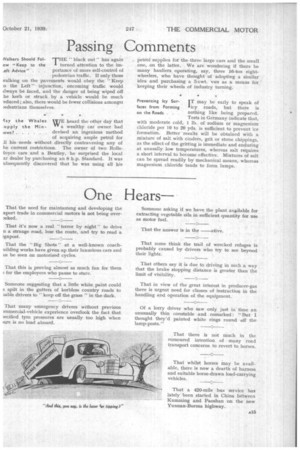Passing Comments
Page 17

If you've noticed an error in this article please click here to report it so we can fix it.
Nalkers Should FolriE" black out" has again
ow e Keep to the turned attention to the im .eft Advice" . . portance of more self-control of pedestrian traffic. If only those walking on the pavements would obey the " Keep :o the Left" injunction, oncoming traffic would dways be faced, and the danger of being wiped off he kerb or struck by a vehicle would be much educed ; also, there would be fewer collisions amongst iedestrians themselves.
lay the Whales WE heard the other day that up ply the MinTY a wealthy car owner had Lows? devised an ingenious method of acquiring ample petrol for ,11 his needs without directly contravening any of he current restrictions. The owner of two Rollstoyce cars and a Bentley, he surprised the local ar dealer by purchasing an 8 h.p. Standard. It was ubsequently discovered that he was using all his petrol supplies for the-three large cars and the small one, on the latter. We are wondering if there be many hauliers operating, say, three I6-ton eightwheelers, who have thought of adopting a similar idea and purchasing a 5-cwt van as a means for keeping their wheels of industry turning.
Preventing Icy SurIT may be early to speak of faces from Forming 'icy roads, but there is on the Roads . . . nothing like being prepared.
Tests in Germany indicate that, with moderate cold, 1 lb. of sodium or magnesium chloride per 10 to 20 yds. is sufficient to prevent ice formation. Better results will be obtained with a mixture of salt with cinders, grit or stone chippings, as the effect of the gritting is immediate and enduring at unusally low temperatures, whereas salt requires a short interval to become effective. Mixtures of salt can be spread readily by mechanical means, whereas magnesium chloride tends to form lumps.




















































